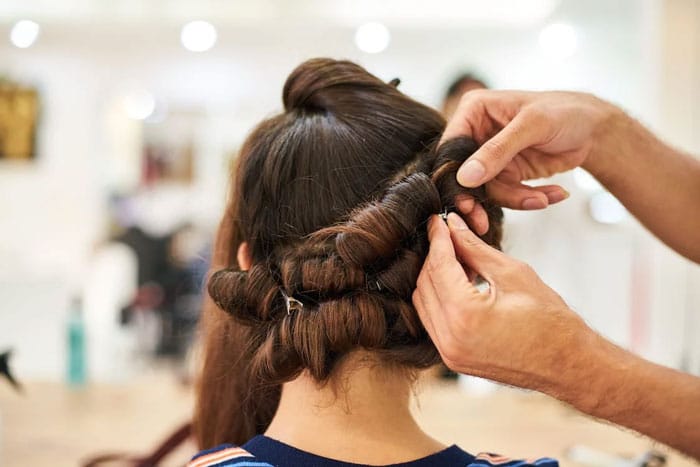
This post presents detailed information on the hairdresser career, including how to become one, the various opportunities involved, and the benefits of being a hairdresser.
How to Become a Hairdresser
The steps to becoming a hairdresser are:
- Research
Research and understand the requirements for becoming a hairdresser in your state or country.
This may include obtaining a license or certification, completing a certain number of training hours, and passing a written and practical exam.
2. Formal education
Consider completing a formal education program in cosmetology or a related field.
Many hairdressing schools offer programs that provide hands-on training and prepare students for licensing exams.
Complete the required training hours and pass any necessary exams to obtain a license or certification.
In some cases, this may require completing an apprenticeship program.
3. Experience
Gain experience by working as an assistant or apprentice at a salon or barbershop. This will allow you to learn from experienced professionals while also gaining actual experience in the field.
4. Build Portfolio
Build your professional portfolio by showcasing your work through photos and online profiles.
This can help you attract clients and stand out in the competitive hairdressing industry.
5. Continuing education
Engage in continue learning and staying up-to-date on new styles and techniques by attending workshops and continuing education courses.
6. Specialization
Consider specializing in a particular area of hairdressing, such as color, styling, or cutting. This can help you stand out in the industry and attract a specific type of clientele.
What Hairdresser Do
Hairdressers perform various duties, including coloring and cutting customers’ hair, offering various hairstyles and colors to suit customer needs and their style. See detailed hairdresser job description.
Hairdresser Career Opportunities
Here are various career opportunities that hairdressers can access:
- Salon Manager
Salon managers are responsible for ensuring the smooth running of a salon. This includes managing budgets, scheduling appointments, and supervising staff.
They may also be responsible for marketing the salon, negotiating contracts with suppliers, and ensuring that the salon is in compliance with all relevant laws and regulations.
Salon managers often work closely with the salon owner to develop and implement strategies to increase business and profitability.
2. Salon Owner
Salon owners are responsible for all aspects of running a salon. This includes managing budgets, marketing the salon, hiring and training staff, and negotiating contracts with suppliers.
Salon owners are also responsible for ensuring that the salon is in compliance with all relevant laws and regulations.
In addition to managing the salon, salon owners may also work as hairdressers, providing services to clients.
3. Salon Educator
Salon educators are responsible for training and educating hairdressers on new techniques and products.
They may work for a specific brand or company, or may be self-employed and offer training to salons and hairdressers on a freelance basis.
Salon educators may lead seminars, workshops, and other educational events, and may also create and deliver online training materials.
4. Creative Director
Creative directors are responsible for leading a team of hairdressers and setting the direction and vision for a salon.
They may work closely with the salon owner to develop and implement strategies for promoting the salon and attracting new clients.
Creative directors may also be responsible for creating and implementing new styles and trends, and for staying up-to-date on the latest techniques and products in the industry.
5. Celebrity Hairstylist
Celebrity hairstylists are responsible for styling the hair of celebrities for red carpet events, photoshoots, and other public appearances.
They may work with a team of stylists to create the perfect look for each event, and may also be responsible for maintaining relationships with clients and booking future appointments.
Celebrity hairstylists often work under tight deadlines and may need to be available to travel on short notice.
6. Session Stylist
Session stylists work on photo shoots, fashion shows, and other events where they are responsible for styling the hair of models and actors.
They may work with a team of stylists to create the desired look for each event, and may also be responsible for maintaining relationships with clients and booking future appointments.
Session stylists often work under tight deadlines and may need to be available to travel on short notice.
7. Platform Artist
Platform artists are hairdressers who demonstrate their skills on stage at hair shows and events.
They may also be responsible for teaching seminars and workshops to other hairdressers.
Platform artists are often chosen for their expertise and creativity, and may be asked to create and present new styles and techniques at events.
8. Product Representative
Product representatives are responsible for promoting and selling professional hair care products to salons and hairdressers.
They may work for a specific brand or company, and may be responsible for building and maintaining relationships with clients and introducing new products to the market.
Product representatives may also be responsible for educating hairdressers on the use and benefits of different products.
9. Technical Director
Technical directors are responsible for leading a team of hairdressers in the development and implementation of new hair styles and techniques.
They may work closely with the salon owner or creative director to develop strategies for promoting the salon and attracting new clients.
Technical directors may also be responsible for training and educating staff on new techniques and products, and for staying up-to-date on the latest trends in the industry.
10. Hair Colorist
Hair colorists are hairdressers who specialize in coloring and highlighting techniques. They may work as a freelance artist or in a salon.
Challenges faced by Hairdressers on the Job
Here are major challenges faced by hairdressers on the job:
- Keeping up with changing trends and techniques
The hair and beauty industry is constantly evolving, and hairdressers need to stay up-to-date on the latest trends and techniques in order to stay competitive and provide high-quality service to their clients.
This can be a challenge, especially for those who are working full-time and may not have a lot of time to invest in continuing education and training.
2. Managing time and schedule effectively
Hairdressers often have a busy schedule, with many clients to see in a single day. It can be challenging to manage time effectively, ensuring that each client receives the attention and care they deserve while also meeting the demands of the job.
3. Dealing with difficult clients
As with any customer service job, hairdressers may encounter difficult or unhappy clients from time to time.
It can be a challenge to maintain a professional and positive attitude in these situations and find a way to resolve any issues or concerns the client may have.
Major Benefits of a Hairdresser Career
Here are major benefits you can get as a hairdresser:
- Creativity and self-expression
A hairdresser career allows individuals to use their creativity and artistic skills to transform the appearance of their clients through hairstyling, coloring, and cutting techniques.
2. Flexibility
Many hairdressers are self-employed or work on a freelance basis, which allows for a flexible schedule and the ability to set their own working hours.
3. Opportunities for advancement
With experience and training, hairdressers can advance their careers by becoming salon managers, education trainers, or even opening their own salons.
4. Personal satisfaction
Many hairdressers find great satisfaction in helping clients feel good about themselves by enhancing their appearance.
5. Variety of work environments
Hairdressers can work in a variety of settings, including salons, spas, and cruise ships.
6. Opportunity to meet new people
Hairdressers have the opportunity to interact with a diverse range of clients on a daily basis, which can be a rewarding and enjoyable aspect of the job.
7. Competitive pay
With the right training and experience, hairdressers can earn a competitive salary, especially in high-end salons or when working on a freelance basis.
Conclusion
The hairdresser career is a challenging and rewarding one that requires strong communication skills, a passion for the beauty industry, and a dedication to providing excellent customer service. If you have the necessary skills and experience, and are looking for a dynamic and exciting career opportunity, then becoming a hairdresser is a good deal.












